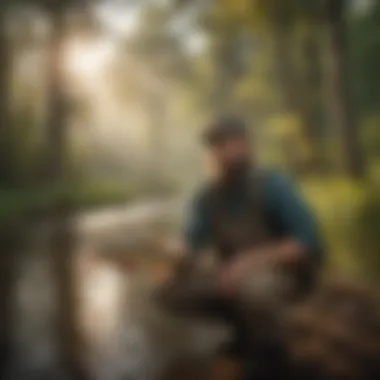Navigating the Texas Game and Fish License System


Intro
Texas, with its vast landscapes, rich biodiversity, and abundant natural resources, serves as a prime location for outdoor enthusiasts. The state offers various opportunities for hunting and fishing, crucial activities valued both for recreation and wildlife management. However, participating in these activities requires a strong understanding of the Texas game and fish license system.
This guide aims to provide clarity on navigating this system effectively. It will delve into the legal requirements, the different types of licenses available, the application process, and the regulations that dictate wildlife activities in Texas. In doing so, it seeks to empower readers with the knowledge necessary for responsible engagement in outdoor sports. More than that, this guide also looks at the implications of these licenses in terms of conservation and sustainable practices, ensuring that outdoor activities contribute positively to Texas's ecosystems.
Understanding one's responsibility when engaging with wildlife is not merely about following the law; it is crucial for conservation efforts aimed at preserving the delicate balance of nature. Thus, it becomes imperative for potential hunters and fishers to grasp the significance of their licenses.
Let’s begin with the types of licenses available and the roles they play in today's wildlife management.
Prelims to Texas Game and Fish Licensing
The role of game and fish licensing in Texas extends beyond mere paperwork; it is a fundamental element in the sustainable management of the state’s wildlife resources. Not only does it ensure lawful participation in hunting and fishing, but it also reflects a commitment to the ethical engagement with nature. Understanding these licenses is crucial for anyone wishing to partake in outdoor recreational activities, as it shapes your responsibilities and your rights as a hunter or angler.
Licensing serves as a framework that supports conservation efforts. The fees collected from these licenses contribute directly to wildlife management programs, habitat restoration, and educational initiatives aimed at promoting responsible practices. This, in turn, has long-term benefits for biodiversity and ecosystem health. Through compliance with licensing regulations, individuals help maintain a balance in the ecosystems they engage with, thus protecting the species and habitats that contribute to Texas’s natural heritage.
In this section, we will explore the importance of licenses and provide a broad overview of the wildlife regulations within Texas, setting the stage for a deeper understanding of the game and fish licensing system.
Understanding the Importance of Licensing
Licensing is more than a formal requirement for hunters and fishers; it plays a vital role in regulating activities that could otherwise lead to overexploitation of natural resources. In Texas, game and fish licenses are needed to ensure that individuals adhere to established regulations concerning seasons, species, and methods of hunting and fishing. This compliance reduces the risk of illegal practices that could harm wildlife populations.
Moreover, licenses can also serve as a means of promoting public safety. Many hunting and fishing activities carry inherent risks, and licensing often involves an educational component that prepares individuals to engage responsibly. As a result, those who possess valid licenses are more likely to be informed about safe practices and the ecological impacts of their activities.
Overview of Texas Wildlife Regulations
Texas has a comprehensive set of wildlife regulations aimed at preserving its diverse ecosystems. The regulations encompass various aspects, including seasons for different game species, bag limits, and specific methods allowed for hunting and fishing. Each year, the Texas Parks and Wildlife Department publishes updates to these regulations, reflecting new scientific research and conservation needs.
The regulations are structured to ensure that wildlife populations remain sustainable. For example, specific species may have stricter limits or closed seasons to protect their populations during critical periods, such as breeding or migration. It is imperative for those interested in hunting or fishing to familiarize themselves with these rules, as failing to comply can lead to legal repercussions and negatively impact wildlife conservation efforts.
In summary, understanding the importance of game and fish licensing and the related regulations forms the groundwork for responsible participation in wildlife activities in Texas. This knowledge enables hunters and fishers to contribute positively to conservation initiatives while enjoying the natural resources the state has to offer.
Types of Game and Fish Licenses
Understanding the types of game and fish licenses is essential for anyone who wants to engage in hunting or fishing in Texas. Different licenses cater to various needs based on residency, type of activity, and duration of the license. Selecting the right type is crucial as it impacts legal compliance, personal preferences, and overall engagement in wildlife activities.
Resident versus Non-Resident Licenses
Texas offers licenses for both residents and non-residents. A resident license is available for individuals who have established their primary home in Texas for at least six months. This type of license typically comes at a lower fee than its non-resident counterpart, making it an attractive option for locals who hunt or fish regularly.
Conversely, a non-resident license is designed for individuals who live outside of Texas. These licenses tend to have higher fees because they are aimed at those who visit the state solely for hunting or fishing. It is imperative for non-residents to understand that specific rules apply based on their residency status when engaging in these activities.
Hunting Licenses
Hunting licenses are crucial for anyone wishing to hunt in Texas. They are categorized into several types, each designed to meet different needs.
Annual Hunting License
The Annual Hunting License is a widely used license valid for one year from the date of purchase. Its primary contribution to hunting in Texas lies in its accessibility and affordability. Most hunters prefer this license because it allows for year-long participation in hunting activities without the need to renew frequently.
One key characteristic of this license is that it grants access to the majority of game species in the state. The most significant advantage is that hunters can plan trips throughout the year, aligning with hunting seasons. However, an annual commitment might be less appealing for those who only hunt occasionally.
Multi-Year Hunting License
The Multi-Year Hunting License is an option for those who plan to hunt in Texas over several years. This license typically spans two to five years. Its advantage is in the convenience it offers, allowing holders to save on costs over time compared to purchasing annual licenses consecutively.
A unique feature of the Multi-Year Hunting License is that it provides peace of mind for serious hunters, knowing their investment covers multiple seasons. However, for those who may change their minds or circumstances, this long-term commitment may not be ideal.


Specialty Hunting Licenses
Specialty Hunting Licenses cater to specific types of hunters or conditions. These licenses, such as those for youth or persons with disabilities, aim to promote inclusivity in hunting. They usually come with specific features tailored to support these groups, such as lower fees or unique requirements.
The primary benefit of specialty licenses is they enable broader participation in hunting. However, a potential disadvantage could be that some specialty licenses may have additional restrictions or requirements that standard licenses do not.
Fishing Licenses
Fishing licenses are equally important for anyone interested in fishing across Texas waters. Like hunting licenses, fishing licenses offer various types based on the angler's needs.
Freshwater Fishing License
The Freshwater Fishing License is the most commonly selected license for those intending to fish in lakes, rivers, and ponds within Texas. Its contribution to the basice fishing experience in Texas cannot be overstated. The simplicity and limited cost make it a popular choice.
A key characteristic of this license is that it facilitates fishing in all freshwater bodies, covering most local fishing opportunities. The main advantage lies in its accessibility to casual anglers. Still, it may not cover saltwater fishing, which can limit options for those seeking a more diverse fishing experience.
Saltwater Fishing License
The Saltwater Fishing License is essential for anyone wishing to fish in the Gulf of Mexico or other saltwater bodies. The primary contribution here is the ability to target saltwater species legally. This license often comes at a higher cost.
One highlight of the saltwater license is its capability to provide anglers with access to a different array of fish species not available in freshwater. However, for anglers mainly concerned with freshwater fishing, this option increases costs without added benefits.
Combination Fishing License
The Combination Fishing License allows anglers to fish in both freshwater and saltwater. This type is beneficial for enthusiasts who want comprehensive access to different fishing environments. Its main characteristic is the versatility it offers.
A unique feature of the Combination Fishing License is that it often combines both fees into a single license, making it convenient for active fishers. However, as with any combination license, the cost might be higher due to the extended benefits it offers.
Application Process for Licenses
Understanding the application process for game and fish licenses in Texas is crucial. This section provides clarity on where and how to apply, ensuring potential hunters and fishers can easily navigate the system. The application process reflects the state's dedication to managing wildlife responsibly. By comprehending these steps, individuals can avoid delays, ensure compliance, and engage in sustainable practices. The process also offers insights into helpful resources and tips that can simplify application experiences.
Where to Apply for Licenses
Applying for a Texas game and fish license can be done through various channels. The primary locations to apply include:
- Texas Parks and Wildlife Department (TPWD) Offices: These offices offer direct assistance and guidance.
- Authorized Retailers: Many sporting goods stores can assist with applications. Stores often have staff trained to help you.
- Online Portal: The TPWD website provides an efficient digital platform for applications.
Understanding where to apply ensures that hunters and fishers can complete their licensing smoothly, avoiding unnecessary hurdles.
Online Application Process
The online application process is streamlined for user convenience. It allows applicants to fill out necessary forms from the comfort of home. Here are the steps to apply online:
- Visit the TPWD website: Navigate to the official site for game and fish licenses.
- Create an account or log in: If you’re a new user, set up a personal account. Returning users can simply log in.
- Choose the desired license type: Select between hunting or fishing licenses based on your activities.
- Fill out the required information: Provide all relevant personal information as requested. Accuracy is important.
- Make payment through secure channels: The website features secure payment options to complete your transaction.
- Receive confirmation: After processing, you will get a confirmation email or notification.
Online applications are efficient and provide applicants with immediate recording of their requests.
In-Person Application Process
For those who prefer personal interaction, applying in person is also an option. This process can be beneficial for individuals who may have questions that they want to address with an official. Steps involved include:
- Locate a TPWD office or authorized retailer: Use the website to find the nearest location.
- Bring necessary identification and information: Have your identification ready, such as a driver’s license or other forms of ID. Also, consider bringing documents that verify residency.
- Complete the application form: You will fill this out once at the location. Staff will usually be available to assist if you need help.
- Submit your payment: After completing your application, present payment to finalize the process.
In-person applications can make the process more straightforward for those who prefer face-to-face assistance or have unique circumstances.
Costs Associated with Licenses


Understanding the financial implications of Texas game and fish licenses is crucial for both casual and serious participants in hunting and fishing. The licensing costs may seem straightforward, yet they encompass a range of variables that can greatly impact one’s overall expenditure in outdoor sports. Knowing how fees break down, the availability of discounts, and any added costs for permits is essential. This understanding allows hunters and fishers to budget appropriately and prioritize their spending effectively.
Standard Fees for Licenses
The standard fees for licenses in Texas vary according to the type of activity and the residency status of the applicant. A basic resident hunting license costs around $25, while a saltwater fishing license is usually set at about $35. Despite these fees being comparably low, they contribute significantly to wildlife conservation efforts. The money generated through these licenses is often allocated to maintaining habitats and ensuring sustainable wildlife populations.
It is essential to note that applying for different types of hunting or fishing licenses may result in varied fees. For example, individuals pursuing a multi-year hunting license may find a cost-effective solution compared to purchasing annual licenses repeatedly.
Discounted Licenses for Seniors and Other Groups
Texas recognizes the importance of making outdoor activities accessible to everyone, especially for specific groups. Seniors aged 65 and older often qualify for reduced fees, significantly lower, typically around $7 for hunting licenses. In addition, certain discounts are available for military veterans and active-duty members as a token of appreciation for their service.
These discounts encourage participation from demographics that might otherwise feel deterred by standard costs. Such initiatives reinforce the state's commitment to fostering outdoor engagement across age and service backgrounds, enhancing wildlife conservation efforts through broader participation.
Additional Costs and Permits
Additional costs often accompany standard licenses and can vary based on specific needs and activities pursued by hunters and fishers.
Game Tags
Game tags are an essential consideration for hunters in Texas. They serve as a record-keeping tool that ensures compliance with state regulations regarding bag limits and species protection. Each game tag is typically included with a hunting license, but some hunters opt for extra tags when seeking to harvest more animals than the initial license allows.
This choice offers flexibility but incurs additional costs. The key characteristic of game tags is their role in sustainable wildlife management. They help regulate hunting practices and maintain a balance in ecosystems. Although there may be added expenses associated, the ability to harvest legally and responsibly can ultimately be worth it.
Special Hunting or Fishing Permits
Special permits are required for particular activities beyond what general licenses cover. For instance, permits for hunting specific game, such as alligator or certain migratory birds, may carry additional charges. The unique feature of these permits is that they often come with specific regulations or restrictions designed to protect vulnerable wildlife populations.
Participants in these special activities should be ready for extra costs. However, the advantage of these permits is clear: they grant access to otherwise restricted hunting and fishing areas. Understanding regional regulations and potential expenses tied to these permits is critical for informed participation in outdoor sports in Texas.
The costs associated with licenses are not merely fees but vital contributions to conservation efforts, reflecting the responsibility of hunters and fishers in protecting Texas's wildlife.
Regulatory Compliance and Wildlife Management
Navigating the Texas Game and Fish License requires a clear understanding of regulatory compliance and wildlife management. This aspect is crucial for sustaining both wildlife populations and the habitats they inhabit. License holders play a significant role in ensuring ethical and legal practices in hunting and fishing. When regulations are followed, the overall health of ecosystems improves, which provides a more enjoyable experience for everyone engaged in outdoor activities. It cultivates a community of responsible sportsmen and ensures that resources remain available for future generations.
Understanding Season Dates and Bag Limits
In any wildlife management strategy, season dates and bag limits are essential components. Each species has defined hunting and fishing seasons, which help in maintaining healthy population levels. The Texas Parks and Wildlife Department carefully sets these dates based on research and biological data.
Bag limits indicate the maximum number of a particular species that can be harvested in one day. This limitation helps prevent over-exploitation, promoting sustainability while also ensuring that varied wildlife populations thrive. It is vital for hunters and fishers to familiarize themselves with these regulations to avoid unintentional violations.
- Hunting Seasons vary by species and region, which can directly affect local populations.
- Fishing Seasons also vary; some species may be protected during specific periods to facilitate breeding.
Knowing and adhering to these rules is not just a legal obligation; it is a moral responsibility toward the environment.
Reporting Requirements for Hunters and Fishers
Another key aspect of regulatory compliance is reporting. Texas requires hunters and fishers to report their harvest, which plays a significant role in wildlife management. Reports can include details such as the type of game taken, location, and quantity. This data is invaluable for wildlife scientists and managers as it allows them to assess population health and adjust regulations as needed.
Hunters and fishers should be aware that failing to report can lead to penalties and affect future regulations. Accurate reporting helps ensure the conservation of species and helps track the overall effectiveness of existing policies. It also provides insights that can lead to improved management strategies in the future.
Consequences of Non-Compliance
You should always recognize the potential consequences of non-compliance with Texas regulated laws. Ignoring rules can lead to fines, license suspension, or even criminal charges. These actions don’t just affect individuals; they can harm wildlife populations and the environment as a whole. Lack of compliance undermines the foundation of conservation efforts, which rely on trust and responsibility from all participants.
When individuals fail to follow regulations, it may result in:


- Increased fines: This reflects the seriousness of the violations, which can escalate with repeated offenses.
- Loss of privileges: A license suspension can keep infringers from lawful hunting or fishing for an extended period.
- Damage to ecosystems: Overharvesting or illegal practices can disrupt the balance of wildlife populations, which could have long-term impacts on biodiversity.
In summary, regulatory compliance is vital for responsible wildlife management and resource sustainability. Texas’ Game and Fish License system serves as a framework not only for legal compliance but also for fostering an appreciation for conservation among hunters and fishers.
Special Considerations for Youth and Disabled Persons
When discussing the Texas game and fish license system, it is crucial to address special considerations for specific groups, such as youth and individuals with disabilities. These groups often face unique challenges when it comes to engaging in outdoor activities. Therefore, understanding the provisions in place for them is essential for fostering a more inclusive environment in wildlife recreation.
Youth Hunting and Fishing Licenses
Youth hunting and fishing licenses in Texas allow younger individuals to participate in outdoor sports while learning about responsibility and conservation. The state offers reduced-fee licenses specifically designed for youths, typically available for individuals who are 16 years of age and younger. These licenses give young people the chance to develop skills and appreciate nature, ensuring they grow into informed and respectful hunters and fishers.
Benefits of youth licenses include:
- Affordability: Lower cost encourages participation.
- Education: Provides a platform for teaching ethical wildlife practices.
- Mentorship opportunities: Engaging experienced hunters or fishers promotes knowledge transfer.
These programs also often run special youth days, allowing young people to hunt or fish in a supportive environment, often with adult supervision. Such initiatives enhance their confidence and ability to follow regulations.
Licenses for Individuals with Disabilities
The Texas Parks and Wildlife Department recognizes the importance of access to wildlife activities for individuals with disabilities. They provide special licenses and accommodations to ensure that everyone has the potential to engage with nature. These licenses often come with unique features, including reduced fees and additional allowances related to specific disability requirements.
Key elements associated with licenses for disabled persons include:
- Accessibility options: The department may allow for alternative methods of hunting or fishing to suit various needs.
- Companion policies: Many licenses permit caregivers or accompanying individuals to assist in the hunting or fishing process.
- Specialized programs: Events and initiatives are designed exclusively for individuals with disabilities, ensuring they can participate in a comfortable setting.
Ensuring that everyone, regardless of age or ability, has the opportunity to connect with nature is a core principle of responsible wildlife management.
Understanding these considerations helps inform policies that protect and encourage participation in outdoor activities. Additionally, they serve as a way to foster a diverse and engaged community of hunters and fishers, ultimately benefiting conservation efforts and wildlife management as a whole.
Conservation Efforts and the Role of Licenses
Conservation efforts in Texas heavily rely on the framework established by game and fish licenses. These licenses play a crucial role in funding various wildlife programs and ensuring sustainable practices. When individuals purchase a license, they contribute directly to the conservation initiatives that benefit the state's diverse ecosystems.
License Fees and Conservation Funding
The fees collected from game and fish licenses are allocated to several conservation programs. These include habitat restoration, wildlife research, and educational outreach. In Texas, a significant portion of license fees is directed towards the Texas Parks and Wildlife Department. This department uses the funds for various projects aimed at preserving natural habitats and promoting biodiversity.
"Every dollar spent on licenses translates into actionable conservation efforts that reverberate through ecosystems throughout Texas."
These programs are not merely administrative; they lead to tangible results. For instance, efforts like the restoration of wetlands and management of endangered species rely heavily on these financial resources. In addition to habitat protection, the funds support public awareness campaigns that educate the community on the importance of wildlife conservation and responsible behaviors.
Impact on Wildlife Population Management
Game and fish licenses also play an integral role in wildlife population management. By regulating hunting and fishing activities, the state can maintain sustainable population levels of various species. License requirements help set enforcement mechanisms, defining season dates and bag limits to prevent overharvesting.
In Texas, statistical studies monitor population dynamics. These studies inform wildlife management strategies, ensuring that species are not depleted. Hunter and angler reports also contribute vital data that assists in assessments of wildlife health and stability.
Ultimately, the intricately linked system of licensing and conservation fosters a collaborative environment between wildlife agencies and outdoor enthusiasts. This partnership is essential for adapting to changing environmental conditions and addressing challenges posed by habitat loss and climate change. By engaging responsibly with the outdoors, license holders become active participants in the mechanisms that safeguard Texas's wildlife for future generations.
Ending
In the realm of outdoor activities, navigating the Texas game and fish license system is of paramount importance. This guide has illuminated the essential aspects of obtaining and utilizing these licenses. Engaging in hunting and fishing entails legal and ethical responsibilities. It is crucial for participants to understand how their actions directly affect Texas’s wildlife and natural resources.
The Importance of Responsible Wildlife Engagement
Responsible wildlife engagement goes beyond adhering to regulations. It encompasses fostering a deeper connection with nature. When individuals engage in hunting or fishing, they contribute to the broader ecosystem. This involvement must be based on respect for wildlife and adherence to legal mandates. By obtaining the appropriate licenses, hunters and fishers demonstrate a commitment to sustainable practices. This ensures they participate not just as users of resources but as stewards of the environment. Notably, every license fee contributes to conservation efforts, which ultimately help sustain wildlife populations.
Encouraging Sustainable Practices
Sustainable practices in hunting and fishing are vital for long-term ecological health. These practices include adhering to defined season dates and bag limits. Complying with these regulations minimizes negative impacts on local wildlife populations. Moreover, education plays a significant role in fostering sustainable habits. Organizations can provide resources and training, highlighting best practices for responsible engagement. By promoting awareness about the ecological significance of these practices, communities can help ensure that future generations enjoy the natural beauty Texas has to offer.
Taking a conscientious approach to outdoor sports not only benefits the environment but also enhances personal experience. Engaging with nature responsibly and sustainably is more than an obligation; it is an opportunity to preserve the wilderness for the future.



